Marcus Garvey - Part3
Marcus Garvey biography continues...
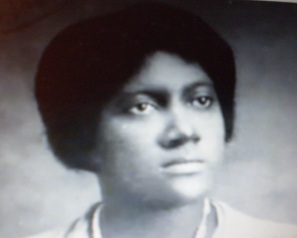 At the end of August 1919, he marries Amy Ashwood (in picture) who a few months earlier, had thrown herself in the line of fire to save his life.
At the end of August 1919, he marries Amy Ashwood (in picture) who a few months earlier, had thrown herself in the line of fire to save his life.
Their extravagant wedding was the talk of Harlem. Five different ministers performed the ceremony before 3,000 guests.
Within four short months, the couple separated. For Garvey, having a wife was a hindrance to his work. He just could not give her the attention she needed!
Meanwhile, UNIA was taking in thousands of dollars a day, but Garvey lived modestly in his 6th floor Harlem apartment.
He did not drink or smoke and preferred to eat the same food night after night.
Unless it was about UNIA business, he rarely spoke to even his closest associate.
August 1, 1920, thousands of UNiA delegates from 25 countries assembled at liberty hall in Madison Square Garden.
Garvey called it the International convention of the Negro peoples of the World.
He hope to move a step closer to his dream of a black nation in Africa with himself as the leader.
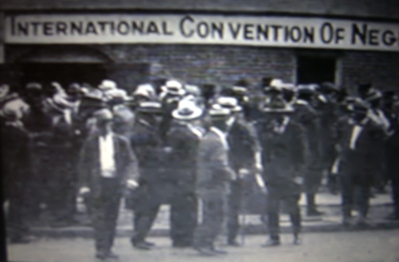
Garvey had now establish a world stage for his movement and gave the black world a government in waiting.
The month long convention would combined substance with overblown symbolism.
He installed officials with titles such as supreme potentate, leader of the American Negroes, and lady commander of the supreme order of the Nile.
...and named himself provisional president of Africa.
Behind closed doors, convention delegates produced a ground-breaking document...a black declaration of rights of thenegro people of the world. It called upon the nations of Europe and America to respect the rights of the black people of the world.
His government in exile conducted its own foreign policy appointing ambassadors and sending a telegram of supportto the Irish republican army.
He dispatched a team of engineers to Liberia to begin construction of a black homeland, and chartered a delegationto the league of nations to argue for the transfer of black colonies to UNIA rule.
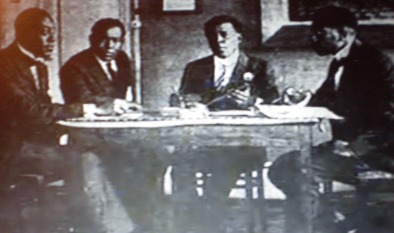
when he finally took to the stage, it was his moment of greatest triumph. He tells the Europeans to give Africa a wide birth because the negroes were coming home.
The day after his speech, a massive UNIA parade stretched through Harlem.
Marcus Garvey now stood at the head of the largest black movement in history.
He claimed millions of followers around the world.
...but with the Black star line hemorrhaging money, and his black critics and the US government on the attack, his fast rising star would soon begin to fall.
Not all black Americans were thrilled by the Garvey movement. Many were embarrassed by the sight of him in Cap and gown.
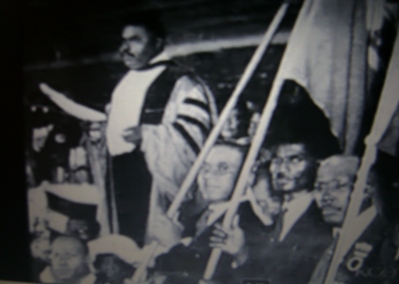
A. Phillip Randolph who introduce him to his first speaking audience, said "Garvey had succeeded in making the Negro the laughing stock of the world." W.E.B Dubois said that he was engaged in a grand distraction.
This was exactly the kind of in-fighting that the government needed to see!It legitimize their motive to move against him.
Encouraged by the growing black opposition, the US government step up surveilance of Garvey and the UNIA.
Eight federal agencies reported on his activities, and J. Edgar Hoover resolved to deal with Garvey once and for all.
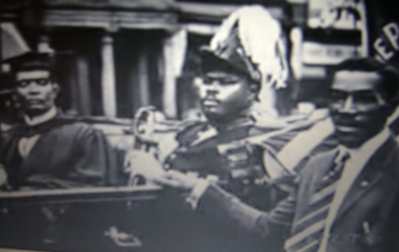
They place spies in the UNIA and damaged the engines of the black star line. His own crew took the black star line to the brink of disaster.
One captain steered his vessel off course to visit his wife. Another had a nervous breakdown and tried to sink the ship.
Enraged with the chaos on one ship, Garvey got into a fist fight with the captain and fired half the crew.
But, he had only himself to blame. He hired people that would be loyal to him and not necessarily competent.
Agent P-138
As things spun out of control, he confided in Herbert Berlin.
To Garvey, he was one of his few good friends, but to J Edgar Hoover, he was agent P-138.
By 1921, the black star line was on the verge of bankruptcy.
Garvey mailed brochures to his supporters advertising stock in yet another ship that did not exist. This was a huge mistake!
Negotiations were ongoing for the purchase of the ship, but no deal was done just yet!
In February 1922, Garvey and two UNIA delegates were arrested for federal mail fraud.
J Edgar Hoover finally had Garvey in his grasp!
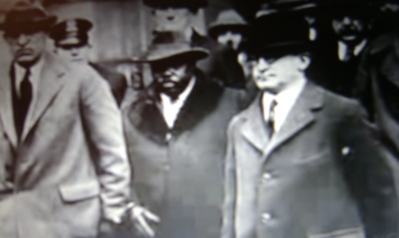
July 1922 while out on bailed Garvy aligned himself with the Klu Klux Klan, a move which led his black critics to question his sanity.
Eight prominent black leader wrote to the Attorney general stating that the UNIA was composed of the most primitiveelements...negro sharks, and negro fanatics.
Garvey fought back!
When W.E.B. Dubois called him the most dangerous enemy of the negro race, Garvey called him a rabid mulatto who needed a horse whipping.
A. Phillip Randolph who called him a half-wit, low-grade moron, received a package in the mail with the hand of white man and note from the KkK, and said that Garvey was responsible.
Garvey denied involvement and surrounded himself with eight body guards, stating the he was the target of violence.
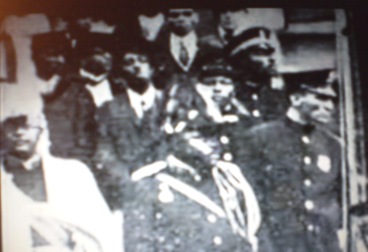
His trial began on May 18, 1923.That very same day, he fired his attorney and announced that he would defend himself.
Defiant, he blamed subordinates, evaded responsibilities for his error, and badgered the jury.
In a closing statement his voice carried into corridor...stating that all he wanted was justice, Justice, justice!
After a 4 week trial his two co-defendants were acquitted and he was given the max of 5 years in prison.
In the end, Garvey was convicted for using the mail to defraud one man Benny Danson of $25...that was the only thing the government found on him!
IN February 1925, after 2 years of appeal, Garvey was escorted to the federal penitentiary.
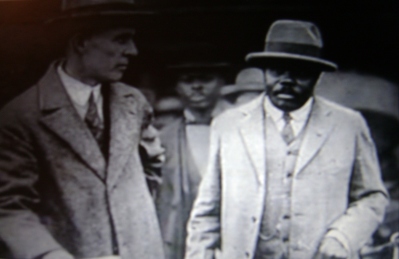
His only asset was $40 and a few worthless stocks in his shipping line.
His personal secretary Amy Jacques became his second wife and While in prison raised thousands of dollars and kept the movement going.
Nov 18, 1927, after serving 2 years and 9 months, Garvey was pardoned by President Calvin coolidge, and ordered deported.
He was put on the SS Yarmouth and sent back to Jamaica from the port of New Orleans.
Back in Jamaica, he received a heroes welcome! He and Amy Jacques-Garvey settled in Kingston and had two sons.
Later, he re-located to England where he had occasional speaking engagements. But for the most part, he was alone. He suffered a stroke in January of 1940 and died a forgotten man.
When his passionate ideas of black pride and independence finally took hold, he would be revered by many as a prophet and and a saint.
In 53 years, he never went to Africa.
Return from MARCUS GARVEY BIOGRAPHY - PART 3 to MARCUS GARVEY PART 2
Return from MARCUS GARVEY BIOGRAPHY - PART 3 to MARCUS GARVEY PART 1




